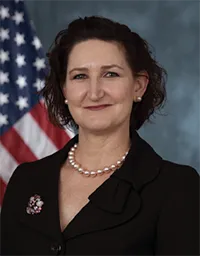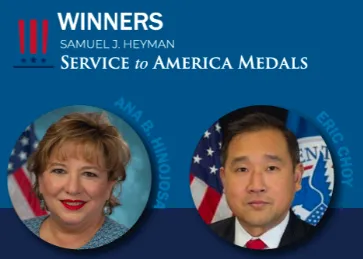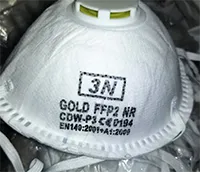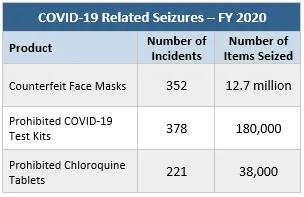CBP Access is an electronic newspage developed by the Office of Congressional Affairs for Members of Congress and staff. If you are interested in subscribing to the CBP Access email distribution list, please send an email to OCAInquiry@cbp.dhs.gov.
In this Update
Message from the Acting Deputy Assistant Commissioner
CBP's trade mission is not only a critical component of national security, it is a significant driving force of the country’s economic prosperity. CBP processes more than $2.3 trillion of imports every year, generating billions of dollars of critical government revenue. CBP is committed to its complex dual role while enforcing nearly 500 U.S. trade laws and regulations on behalf of 49 different partner government agencies. The updates below highlight some of the recent operational and enforcement initiatives CBP has implemented to rigorously enforce all U.S. trade laws and facilitate legitimate trade, helping create a level playing field for American businesses, protect consumers, and reduce trading costs.
–Patrick Schmidt, Acting Deputy Assistant Commissioner
New CBP Trade Leadership

In June, CBP selected AnnMarie R. Highsmith as Executive Assistant Commissioner and John P. Leonard as Deputy Executive Assistant Commissioner to lead the Office of Trade. As stewards of CBP’s trade mission, Ms. Highsmith and Mr. Leonard will oversee CBP’s efforts to facilitate trade and to safeguard America’s national and economic security by creating a level playing field for U.S. businesses, reducing the costs of trade, and protecting American consumers from illicit and unsafe goods.
“Executive Assistant Commissioner Highsmith’s expertise in customs law and experience enhancing the enforcement of those laws make her uniquely qualified to lead CBP’s trade modernization efforts,” said Troy Miller, the CBP Senior Official Performing the Duties of the Commissioner. “Under Executive Assistant Commissioner Highsmith’s leadership, I am confident that the CBP Office of Trade will continue to strengthen America’s national security and economic prosperity.”
Ms. Highsmith had served as CBP’s Deputy Chief Counsel since 2013. As the chief operating officer of one of the government’s premier legal teams, Ms. Highsmith enhanced CBP’s enforcement of trade laws designed to protect U.S. consumers and businesses. She also aligned customs procedures with modern business practices to enhance the economic competitiveness of the United States. In addition to her service with CBP, Ms. Highsmith served as Acting Chief Counsel for U.S. Citizenship and Immigration Services (2020) and Acting Associate General Counsel for General Law at the U.S. Department of Homeland Security (2013). Ms. Highsmith received the Distinguished Executive Presidential Rank Award in 2017.
Combating Forced Labor in Supply Chains
CBP continues to aggressively investigate and prevent goods made by forced labor from entering U.S. commerce. Forced labor is a form of modern-day slavery that violates international labor standards and universal human rights. The United States will not tolerate forced labor in our supply chains and stands against cruel and inhumane labor practices.

In June, DHS Secretary Mayorkas and CBP leadership led a briefing on efforts to combat forced labor in U.S. supply chains. In recognition of DHS and CBP's efforts, the Partnership for Public Service awarded CBP's forced labor team the 2021 Service to America Medal (“Sammies”) for Safety, Security, and International Affairs. Back in August, CBP’s forced labor team was also awarded the 2021 Samuel J. Heyman Service to America Medals People’s Choice Award. Led by Executive Director Ana B. Hinojosa and Deputy Executive Director Eric Choy, CBP’s forced labor team is responsible for investigating goods suspected of being made with forced labor and preventing them from entering the United States.
In Fiscal Year 2021, CBP issued seven Withhold Release Orders and two forced labor findings to protect American consumers and businesses from goods made by forced labor. Those orders have targeted cotton products and tomato products from China’s Xinjiang Uyghur Autonomous Region; silica-based products made by a company that operates in Xinjiang; palm oil from a Malaysian company; and tuna and other seafood harvested by a Chinese fishing fleet, a Taiwan-flagged fishing vessel, and a Fijian-flagged fishing vessel. On Sept. 10, 2021, CBP announced that it had modified the forced labor finding on Top Glove Corporation Bhd. In October, CBP issued Withhold Release Orders on certain disposable gloves manufactured by Supermax Corporation Bhd. and its subsidiaries and on tomatoes produced by a farm in Mexico. In total, CBP has detained 1,213 shipments that contained approximately $414 million of goods suspected to be made by forced labor.1
1. As of August 31, 2021
Enforcement of Intellectual Property Rights Continues as Imports Increase

The U.S. demand for imported goods continues to grow. In September 2021 alone, CBP processed more than 3 million entry summaries valued at more than $259 billion, identifying estimated duties of nearly $8.4 billion to be collected by the U.S. government.

Intellectual property rights violations continue to put America’s innovation economy at risk. Trade in counterfeit and pirated goods threatens the competitiveness of U.S. businesses, the livelihoods of American workers, and the health and safety of consumers. CBP protects the intellectual property rights of American businesses, safeguarding them from unfair competition and use for malicious intent while upholding American innovation and ingenuity. CBP works with many partner government agencies and the trade community to mitigate the risks posed by imports of such illicit goods. In September 2021, CBP seized 2,073 shipments that contained more than $375 million of counterfeit goods.
Strong partnerships and trade laws provide the critical framework required for the agency to confront the unique and unprecedented challenges presented by the COVID-19 pandemic. CBP continues to track a shift in certain product category seizures, including counterfeit, unapproved, or otherwise substandard COVID-19 related products that threatened the health and safety of American consumers. In FY 2020, over half of the COVID-related seizures occurred in the express consignment environment and 24 percent were intercepted in international mail. Roughly 51 percent originated in China. In order to curb the sale of counterfeit or substandard COVID-19 sanitation products or safety equipment online, CBP also published the E-Commerce Consumer Awareness for COVID-19 Safety Guide.
Stopping the Illegal Importation of Hydrofluorocarbons

On September 23, the Department of Homeland Security (DHS) and the Environmental Protection Agency (EPA) announced a new interagency task force that will guard against the illegal importation of hydrofluorocarbons (HFCs). HFCs are potent greenhouse gases with global warming potential that can be thousands of times greater than carbon dioxide. A global phasedown of HFCs could meaningfully prevent the development of adverse global warming effects over the next century.
The American Innovation and Manufacturing Act (AIM Act), enacted in 2020, directs the EPA to address the adverse environmental effects of HFCs by, among other things, phasing down HFC production, consumption, and importation. Coinciding with the task force announcement, the EPA issued its first regulations to implement the AIM Act’s phasedown. DHS, through CBP and Immigration and Customs Enforcement, will work with the EPA’s Office of Air and Radiation and Office of Enforcement and Compliance Assurance to stop illegal HFC imports into the United States, including by preventing the exploitation of U.S. customs laws.
The launch of this joint initiative to enforce the phasedown of HFCs builds on DHS and the EPA’s long-standing, successful collaboration on preventing illegal imports that threaten the environment, including imports of ozone-depleting substances and vehicles that fail to comply with Clean Air Act standards.
Enforcement News From Across CBP
CBP Seizes Fake Designer Handbags, Wallets Worth $314K

Dallas, TX — CBP officers working at the Dallas Fort Worth International Airport intercepted a shipment manifested as pencil bags but instead were packed with various designer bags totaling a Manufacturer’s Suggested Retail Price of $314,000. The shipment originated in Vietnam and was destined for the Dallas area when CBP officers selected it for inspection. When officers opened the four boxes, they found 153 items bearing trademarked brands including Prada, Chanel, Gucci, Louis Vuitton, Dior, Burberry and Fendi. Consumer Products and Mass Merchandise Center of Expertise and Excellence import specialists determined the various handbags and wallets were counterfeit and officers seized the shipment for IPR and trademark violations.
480 Pairs of Fake Chanel Earrings Seized en Route to Little Rock

Memphis, TN — On September 21, CBP officers at the port of Memphis, TN selected for inspection a shipment from the United Arab Emirates en route to an apartment in Little Rock, Arkansas listed as “LADIES JEWELRY.” Inside the shipment officers found 480 pairs of earrings that had the recorded trademarks of Chanel. The earrings were identified as counterfeit based on the low value claimed, incorrect appearance, low-quality construction, and shoddy packaging method. If these had been authentic, and sold for the manufacturers’ suggested retail price (MSRP), the value would have been $324,000.
Louisville CBP Continues to See and Seize Counterfeit Designer Watches

Louisville, KY — CBP officers assigned to the Port of Louisville seized 66 separate shipments containing 3,345 counterfeit designer watches worth $67.07 million, and the flow of counterfeit watches continue. On October 4 and 5, CBP officers made two seizures of 59 Rolex and three Audemars Piguet counterfeit designer watches. Had these watches been real, they would have been worth $2.68 million. The first shipment arrived from Hong Kong and was destined for a residence in Puerto Rico. The second shipment was arriving from Hong Kong and was heading to Miami. Officers inspected these parcels to determine if the goods were admissible in accordance with CBP regulations. The first shipment had 24 Rolex watches and 3 Audemars Piguet watches, while the second parcel contained 35 Rolex watches. The watches were determined to be counterfeit by CBP’s trade experts at the Centers of Excellence and Expertise. If they were real, the watches would have been valued at $987,000 and $1.69 million respectively.
Office of Congressional Affairs | October 2021


